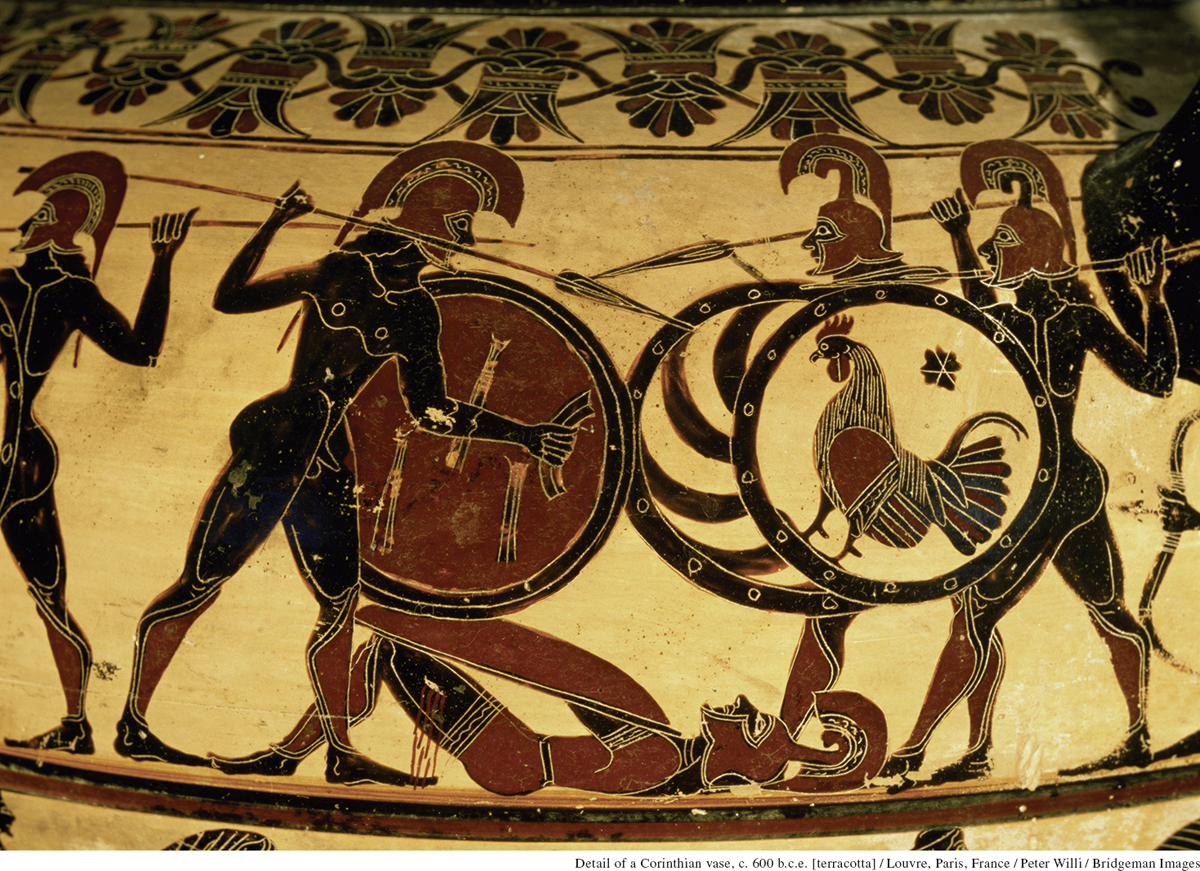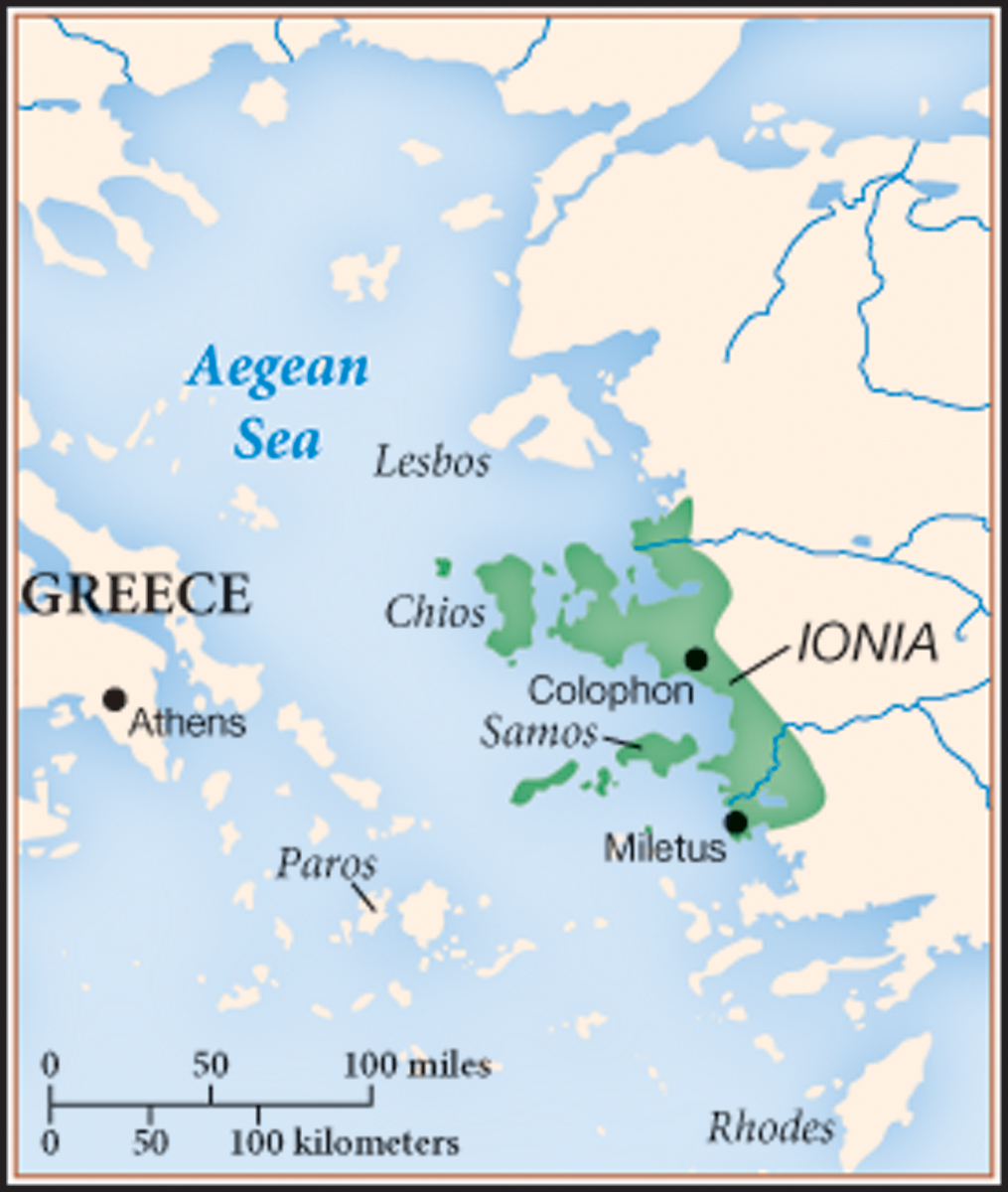New Ways of Thought and Expression in Greece, 630–500 B.C.E.
Printed Page 70
Important EventsNew Ways of Thought and Expression in Greece, 630–500 B.C.E.
The idea that persuasion, rather than force or status, should drive political decisions matched the spirit of intellectual change rippling through Greece in the late Archaic Age. In city-states all over the Greek world, artists, poets, and philosophers pursued new ways of thought and new forms of expression. Through their contacts with the Near East, the Greeks encountered traditions to learn from and alter for their own purposes. By the sixth century B.C.E., Greeks were introducing innovations of their own into art. In ceramics, painters experimented with different clays and colors to depict vivid scenes from mythology and daily life. Sculptors gave their statues balanced poses and calm, smiling faces.
Building on the Near Eastern tradition of poetry expressing personal emotions, Greeks created a new poetic form. This poetry, which sprang from popular song, was performed to the accompaniment of a lyre (a kind of harp) and thus called lyric poetry. Greek lyric poems were short, rhythmic, and diverse in subject. Lyric poets wrote songs both for choruses and for individual performers. Choral poems honored gods on public occasions, celebrated famous events in a city-state’s history, praised victors in athletic contests, and enlivened weddings.
Solo lyric poems generated controversy because they valued individual expression and opinion over conventional views. Solon wrote poems justifying his reforms. Other poets criticized traditional values, such as strength in war. Sappho, a lyric poet from Lesbos born about 630 B.C.E. and famous for her poems on love, wrote, “Some would say the most beautiful thing on our dark earth is an army of cavalry, others of infantry, others of ships, but I say it’s whatever a person loves.” In this poem Sappho was expressing her longing for a woman she loved, who was now far away. Archilochus of Paros, who probably lived in the early seventh century B.C.E., became famous for poems mocking militarism, lamenting friends lost at sea, and regretting love affairs gone wrong. He became infamous for his lines about throwing away his shield in battle so that he could run away to save his life: “Oh, the hell with it; I can get another one just as good.” When he taunted a family in verse after the father had ended Archilochus’s affair with one of his daughters, the power of his ridicule reportedly caused the father and his two daughters to commit suicide.
The study of philosophy (“love of wisdom”) began in the seventh and sixth centuries B.C.E. when some Greek thinkers created prose writing to express their innovative ideas, above all their new explanations of the human world and its relation to the gods. Some also composed poetry to explain their theories. Most of these philosophers lived in Ionia, on Anatolia’s western coast, where they came in contact with Near Eastern knowledge in astronomy, mathematics, and myth. Because there were no formal schools, philosophers communicated their ideas by teaching privately and giving public lectures. People who studied with these philosophers or heard their presentations helped spread the new ideas.


Working from Babylonian discoveries about the regular movements of the stars and planets, Ionian philosophers such as Thales (c. 625–545 B.C.E.) and Anaximander (c. 610–540 B.C.E.), both of Miletus, reached the revolutionary conclusion that unchanging laws of nature (rather than gods’ wishes) governed the universe. Pythagoras, who emigrated from the island of Samos to the Greek city-state Croton in southern Italy about 530 B.C.E., taught that numerical relationships explained the world. He began the Greek study of high-level mathematics and the numerical aspects of musical harmony.
Ionian philosophers insisted that natural phenomena were neither random nor arbitrary. They applied the word cosmos—meaning “an orderly arrangement that is beautiful”—to the universe. The cosmos included not only the motions of heavenly bodies but also the weather, the growth of plants and animals, and human health. Because the universe was ordered, it was knowable; because it was knowable, thought and research could explain it. Philosophers therefore looked for the first or universal cause of all things, a quest that scientists still pursue. These first philosophers believed they needed to give reasons for their conclusions and to persuade others by arguments based on evidence. That is, they believed in logic. This new way of thought, called rationalism, became the foundation for the study of science and philosophy. This rule-based view of the causes of events and physical phenomena contrasted sharply with the traditional mythological view. Many people had difficulty accepting such a startling change in their understanding of the world, and the older tradition of explaining events as the work of deities lived on alongside the new approach.
REVIEW QUESTION What were the main differences among the various forms of government in the Greek city-states?
The early Greek philosophers deeply influenced later times by being the first to clearly separate scientific thinking from myth and religion. Their idea that people must give reasons to justify their beliefs, rather than simply make assertions that others must accept without evidence, was their most important achievement. This insistence on rationalism, coupled with the belief that the world could be understood as something other than the plaything of the gods, gave people hope that they could improve their lives through their own efforts. Xenophanes of Colophon (c. 570–c. 478 B.C.E.) concluded, “The gods have not revealed all things from the beginning to mortals, but, by seeking, human beings find out, in time, what is better.” This saying expressed the value Archaic Age philosophers gave to intellectual freedom, corresponding to the value that citizens gave to political freedom in the city-state.